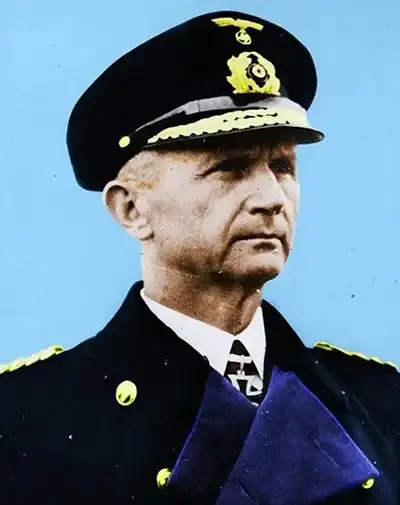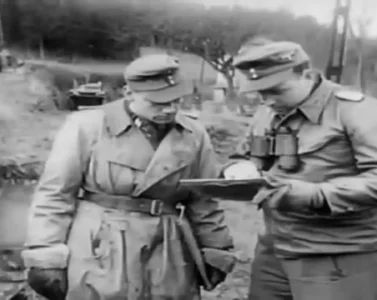- Military History
- Biographies
- Militarians Biographies
- Großadmiral (Grand Admiral) Karl Dönitz
Großadmiral (Grand Admiral) Karl Dönitz
German Admiral, Chief of the Kriegsmarine in World War II; briefly head of the Third Reich after Hitler's suicide
Dönitz was born in Grünau. He joined the German navy on the 1st of April in 1910 and served on U-boats during World War I. This experience persuaded Dönitz that submarines would play an increasingly important role in naval strategy. With the conclusion of World War I, Dönitz remained in the Reichsmarine, the small navy Germany was permitted under the castigatory terms of the Versailles treaty. In fact, Dönitz operated clandestinely to build a German submarine force, even though the treaty specifically prohibited that type of vessels.
Appointed chief of the Submarine Force in 1935, Dönitz played a key role in expanding this aspect of the navy and was promoted to rear admiral shortly after the start of World War II. He held a simultaneous post as flag officer in charge of Germany's submarines.
Dönitz took a relatively unprepared U-boat fleet and created a devastatingly effective campaign against Allied shipping in the North Atlantic. With each success, he made louder noises for increased funding of the submarine program. He was soon highly unpopular with other service chiefs and in particular with the navy commander-in-chief Erich Raeder, who did not favor submarine warfare. Dönitz prevailed and won promotion to vice admiral in 1940 and as admiral in 1942. As his star rose, Raeder's sank and Dönitz replaced him as commander-in-chief of the navy on January 30, 1943. He also continued to serve directly as commander of the U-boat force, which, by this time, constituted the hulk of the German navy.
Dönitz's triumph did not endure through 1943. By the middle of the year, the Allies had achieved outstanding success against the U-boats. Dönitz introduced and advocated advanced submarine technologies, most notably the snorkel, which permitted shallow-depth operation of the diesel engines, saving battery power and extending the time submarines could operate under water. Yet this innovation had little tangible effect on regaining the initiative from the Allies.
Hitler named Dönitz his successor as chancellor in the will he composed on April 30, 1945, the day he committed suicide. For just over a week, the admiral conducted what little was left of the Third Reich. It was he who negotiated surrender to the Allies on May 7.
Dönitz was tried and convicted of war crimes at the Nuremberg tribunal later in 1945. Sentenced to ten years in Spandau Prison, he served his full term and was released in 1956. After his release, he lived out the rest of his life quietly in a suburb of Hamburg. He passed away in 1980 and for nearly seven decades, Dönitz was the only head of state to be convicted by an international tribunal until the conviction of Liberia's Charles Taylor in April 2012.
Dönitz was an extremely capable commander whose advocacy of submarine warfare had a devastating impact on Allied shipping. He is credited with developing the "wolf pack" tactic, whereby submarines hunted in groups and he created a support system for the vessels, including seaborne tankers and submarine tenders, which extended their range. He mastered the art of coordinating aerial reconnaissance with submarine attacks on convoys.
Großadmiral (Grand Admiral) Karl Dönitz - Quick Facts
- German Empire (1866-1918)
- Germany - Weimar Republic (1919-33)
- Germany Nazi (1933-1945)
- 1st U-boat Flotilla (Nazi Germany)
- Befehlshaber der U-Boote (Germany)
- Führer der Unterseeboote (Germany)
- Imperial German Navy (1871-1918)
- Kriegsmarine (Navy Nazi Germany 1935-1945)
- Oberkommando der Marine (Nazi Germany)
- Reichsmarine (Reich Navy - Germany 1921-1935)
- SM UB-68 (German Submarine U-68)
- SM UC-25 (German Submarine U-25)
- Supreme Commander of the Wehrmacht
- WWI (1914-1918)
- Weimar Republic (1918-1933)
- WWII (1939-1945)
- {{#owner}}
- {{#url}} {{#avatarSrc}}
{{name}} {{/url}} {{^url}} {{#avatar}} {{& avatar}} {{/avatar}} {{name}} {{/url}} - {{/owner}} {{#created}}
- {{created}} {{/created}}
























